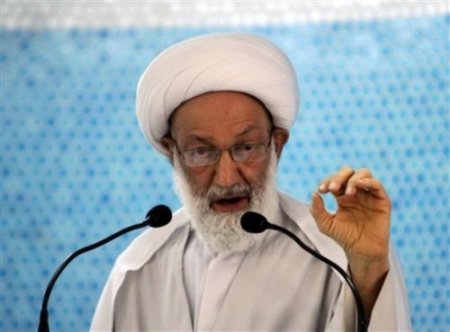![]()
Wed, March 09, 2011 | The Rubin Report | By Barry Rubin

Sheik Isa Qassim, Bahrain's top Shiite Muslim cleric, speaks during midday prayers Friday, Feb. 18, 2011, in the village of Diraz, Bahrain. (Photo: AP)
Bahrain Opposition Cleric: We Want Sharia Law State
Not everyone in the opposition movements in Arab countries are Islamists, of course, but at least outside of Tunisia, where they are also present, they are the most powerful organized force. Here’s an excerpt from the Friday, March 4 sermon of Sheik Isa Qassim, considered the top opposition cleric in Bahrain.
To his credit, he strongly rejects Sunni-Shia conflict. If the government reflected the population, the Shia would rule instead of the Sunni, which is the case at present. Of course, one should note that in Iraq this precise situation has produced bloody strife. In Iran, a Shia Islamist state, there has been widespread discrimination against the Sunni minority.
Sectarian strife is a natural, perhaps unavoidable component of this conflict no matter how much people like Isa make the usual claim that it is only being stirred up by the revolution’s enemies in order to discredit change.
Isa says:
“The criteria that govern our movement are the principles of Sharia [Islamic law]: justice, the national interest, national unity and non-sectarianism. We denounce all sectarian incitement, whether it comes from Shiites or Sunnis….Those who will indulge in hatred because of sectarianism are committing crimes against future generations and against our nation, both at present and in the future.”
Of course, a Sharia regime in Bahrain would have a particular view of what constituted justice. And a Shia-led Sharia regime would also have a specific view of the “national interest” that would presumably include close alignment with Iran.
But can’t you have a moderate state under Sharia law? Washington policymakers can construct such a state in their own minds, and it would be interesting to discuss Saudi Arabia in those terms (extremist in domestic governance, relatively moderate in foreign policy). In many ways, Egypt and Jordan have lived partly under Sharia law.
In reality, though, the Islamists judge these societies to be insufficient. We are dealing with an actually existing radical movement that wants to conquer the whole Middle East, drive out the West, destroy Israel, and in some cases align with Iran. This is not a theoretical exercise about what “might be” under an ideal “moderate Islamist” movement.
There’s another interesting point hidden in Qassim’s talk:
“As for those who call for democracy worldwide, we understand that many countries now demand democracy….However we see some of these countries only offer verbal support when it comes to countries with friendly governments. In fact, we see some attempts to pressure the opposition to accept partial solutions, but these partial solutions will only bring back what we used to have, which was an absolute dictatorship. We suspect some of these calls have been driven by the interests of those countries.”
First, he rejects compromise — the “partial solutions” that many are trying to arrange as a compromise — as an “absolute dictatorship: and thus seems to accept only a Shia-led (they are the majority) Islamist state.
Second, note that he is condemning the United States as not really wanting democracy in “countries with friendly governments.” This is only a couple of weeks after the Obama Administration played a central role in throwing out the Egyptian government. In other words, the United States will get no credit for promoting democracy and even helping anti-American forces into power to “prove” what a nice country it is.
Judging from the nuances of U.S. policy, however, the Obama Administration does seem to be supporting a compromise in Bahrain, conscious that a more radical regime could throw out the Fifth Fleet base there. But that’s the point: the Islamists will not be assuaged. Anything short of supporting their unbridled rule will be viewed by them as total enmity. And if they get into power they will still view the United States with total enmity.



 RSS
RSS















#Bahrain Opposition Cleric: We Want #Sharia Law State | #Shia #Islamism http://j.mp/giNruK
#Bahrain Opposition Cleric: We Want #Sharia Law State | #Shia #Islamism http://j.mp/giNruK
RT @CrethiPlethi: #Bahrain Opposition Cleric: We Want #Sharia Law State | #Shia #Islamism http://j.mp/giNruK
RT @CrethiPlethi: #Bahrain Opposition Cleric: We Want #Sharia Law State | #Shia #Islamism http://j.mp/giNruK
RT @CrethiPlethi: #Bahrain Opposition Cleric: We Want #Sharia Law State | #Shia #Islamism http://j.mp/giNruK